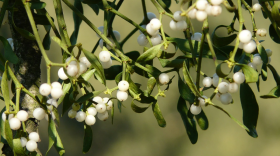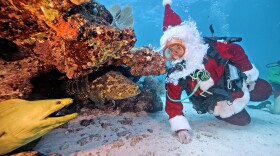During heavy rains last year in a small town outside Havana, people saw something remarkable. Large freshwater catfish called claria were swimming in the flooded streets. In a video posted on YouTube, excited locals splash out to grab them.
But that happy scene was also an environmental alert. Claria are an invasive species in Cuba. They’re supposed to be confined to aquaculture fisheries, where they’re bred for food. Outside those farms – as these claria obviously were – they’re notorious for devouring anything in their paths.
“If claria gets released outside their controlled conditions they can be a serious problem,” said María Araujo, a marine biologist with Cuba’s Science, Technology and Environment Ministry.
Still, speaking by phone from Cienfuegos, a Cuba fisheries center where a lot of claria are grown, Araujo was also adamant about this:
“At this moment," she said, "claria is not a threat to the environment in Cuba. It is under control.”

That’s at least the message Cuba’s communist government wants out there right now. It insists the claria are better contained in their tanks today and that there’s no danger of them escaping again.
Why the earnest talking points? Cuba is facing a growing food shortage. That’s forced the regime to ramp up production of claria as a crucial protein supplement. Officials recently said sausages like chorizo will be made with claria instead of pork – which is scarce right now.
READ MORE: Can US-Cuba Normalization Save Coral Reefs? On July 4, Scientists Said Sí Señor
In a tweet last month, Cuban Commerce Minister Betsy Díaz declared, "Producing alternative foods is work of the first order" for Cuba. (She also blamed the U.S. trade embargo against Cuba, not Cuba's socialist food production policies, as the cause of the current emergency.)

Claria – also known as African catfish – is a big, tasty, and above all resilient fish. It breeds abundantly and cheaply. But now that Cuba has decided to make claria a solution to its economic crisis, can it contain the catfish’s ecological threat?
Scientists outside Cuba say this is a big Catch 22.
“When you’re dealing with a food crisis, farming fish is a good solution," says Martin Grosell, a fish and environment expert at the University of Miami’s Rosenstiel School of Marine and Atmospheric Science.
“Does it come without any risks? No, it does not. The African catfish is controversial because in areas where it’s been released into the environment it has taken over quite readily and is competing with native species. And that’s a big concern.”
Claria were introduced to Cuba 20 years ago during another, more severe economic crisis known as the Special Period. Since then, hurricanes are blamed for letting the fish escape its breeding tanks – and wreak ecological havoc on the island.
Cuba native Martin Arostegui discovered that six years ago on his first fishing trip back to the island since leaving as a youth.
“When I was a little boy in Cuba, I went fishing in the Ciénaga de Zapata for bass," says Arostegui, a retired Miami doctor and sport fisherman, referring to a swampy area in western Cuba.
"And now there’s practically none because the claria have decimated all these fish.”
Claria, which often push other fish out of the way and eat their eggs, have reduced other native Cuban fish like gar and biajaca. Aróstegui says the claria’s size helps makes it such an eco-bully.
“Claria can grow up to 60 or 70 pounds or more," he notes. "In Cuba, local fish in freshwater don’t get to be that big. So the claria will overpower everything.”

By now most Cubans are aware of that. So the government produced a video game four years ago – called "Super Claria" – to improve fish's image. It portrays the omnivorous catfish as an environmental superhero that eats up trash in lakes and rivers.
But U.S. scientists like John Stieglitz have a better idea: replace the super fish with a softer fish.
Stieglitz, a research professor at U Miami's aquaculture facility in Virginia Key, is a Miami native, so he knows all about South Florida's own troubled history with invasive species.
"We've had similar issues with lionfish," he points out. And he says he understands why Cuba has made such a big claria bet.
“When you have a starving population, I think all options are on the table," says Stieglitz. "You don't have the luxury of saying, 'Oh, that's a good species for your environment or that's a bad species.' You're looking for the most efficient production of animal protein, period.
“But we try and steer folks towards using native species.”
And Stieglitz believes there are plenty of those for Cuba to choose from that could the island the same pow for its peso. At the U Miami fishery he points to a tank full of sleek, dark cobia – a prolific ocean fish that's native to Florida and Cuban waters.

Stieglitz says he thinks the U.S. scientific community would be eager to help Cuba make a switch like that –much the same way recent U.S.-Cuba scientific exchanges have helped the two countries salvage threatened coral reefs in their common waters.
But for now, in Cuba, claria is king.
Copyright 2020 WLRN 91.3 FM. To see more, visit WLRN 91.3 FM. 9(MDAyMTYyMTU5MDEyOTc4NzE4ODNmYWEwYQ004))








